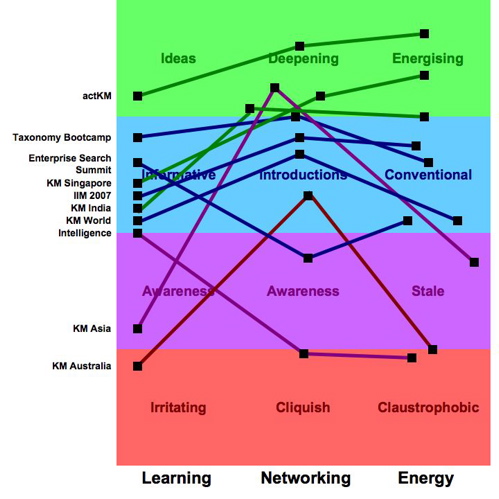Nov 20
Moving the Solution Upstream
Here’s an electricity supply point from Le Meridien in Delhi. Anyone who has forgotten their international adaptor while travelling overseas or has struggled with concierges who have just run out of adaptors because there’s a big international conference going on, will appreciate the beauty of this idea. Build your sockets to take any plug. Why don’t more hotels do this and solve the adaptor problem at the source (literally)?

Nov 19
KM Unconference in Bangalore
For the unconference enthusiasts (the type of conference where the participants run the show) who’ll be in India next week, think about attending the KAMP unconference in Bangalore, India’s first KM unconference. It will be held at the Mindtree office in Bangalore. It’s run on the Barcamp model where people sign up in advance on a wiki and indicate what topics they’d like to host, and what tasks they are volunteering for – oh, and it’s free! Visit the wiki to get a sense of how it’s done – or to join the 150 or so enthusiasts who have already signed up.

Nov 18
Reporting from the Conference Trail
I’m back in the blogosphere, after a five week absence (it feels like five months, and I dare not look at my blog reader). I’ve been on the KM conference trail and at some point early on I decided not to try to combine blogging with meeting and sharing in real space. It’s been an interesting five weeks, and I have to say that daisy-chaining conferences is a wonderful way of getting a closer insight into the dynamics of what makes a good conference tick.
In the chart below you’ll find my own personal assessment of the ten conferences I’ve participated in as a speaker, chair, or facilitator since July this year. I have rated the conferences on three factors which I think are important for a conference’s value:
*Was it informative? Did I learn something new?
*Did it attract a good crowd - by which I mean quality not quantity. Was it diverse, interesting, with people who are keen to learn and share and network?
*Was the energy level managed well? Did the environment and variety of activities keep me engaged and enthusiastic?
I should qualify this by saying that these are my personal assessments in relation to my own learning, networking and energy levels.

Oct 18
Do Knowledge Managers Really Want to Share Knowledge?—Sharing as a Mating Game

I’ve had a creeping suspicion for some time that knowledge managers are fine about encouraging others to share knowledge, but that dictum doesn’t apply to them. In my role as President of iKMS I am always trying to get knowledge managers to share, and the ones who do are in the brave minority - even then, they tend to be far more reluctant to share in a public forum than in a private one. They have reasons, of course: lack of experience and confidence, lack of clear progress and successful results to show, restrictions by employers. But in such a young profession, with such instability of career progression and continuity of KM staff, with extensive inexperience among managers who are responsible for KM, sharing is about the only way to get access to experience faster. The obsession with success is an illusion born of that inexperience. We learn fastest through examining lack of success, and the more mature professions such as medicine and law and engineering recognise that. They have rituals for anatomising failure, and it’s not for fun, it’s because that’s how they learn and survive.
Oct 16
A Life Less Complex
Life is a series of experiments; we seldom know which choices are best for us until they have run their course. We also seldom know where a path we’ve chosen will take us until we’ve gotten to the end. Robert Frost took the one less traveled, but when did he know that that made all the difference if not at the end? Life is retrospectively coherent. It is complex, but that doesn’t stop us from trying to make it less so.
Oct 09
Online Conference-slash-Unconference on Corporate Learning
This looks like fun! On online conference, free (but requires registration) partly wiki based, with synchronous and asynchronous discussions. Here’s the invitation from co-organiser Tony Karrer (via Saul Carliner):
“I just wanted to make you aware of a conference that I’m helping George Siemens to organize – Corporate Learning: Trends and Innovations – Nov. 15 – 20, 2007. There is no formal marketing effort for the conference – purely word of mouth. But I wanted to make sure that I alerted folks who I thought might have interest.
The conference will be held fully online (with live presentations and asynchronous discussions). There’s an exceptional group of speakers/discussion leaders including:
David Snowden
Jay Cross
Rebecca Stromeyer
Richard Straub
Clark Quinn
Donald H. Taylor
Janet Clarey
David Wilson
Bill Bruck
George Siemens, and
Tony Karrer
Conference details are still coming together. Stay tuned to the Wiki for details and go to the registration page to register and sign up for the newsletter to get updates.
In fact, part of the fun of the conference is that it will be a blend of a traditional conference with notable speakers, an unconference with discussion sessions based purely on the interests and questions of attendees, online discussion, etc. We’ve tried to take into account some of the main ideas from better conferences. What’s interesting is that many of the ideas are easier to implement for an online conference. The conference is free, registration is required. Duke Corporate Education and TechEmpower are sponsoring and assisting in organizing the event.
It’s an exciting opportunity to discuss current trends and innovations in corporate training environments around the world… If you have thoughts or ideas on what would make this a great event, please provide ideas. I’ve posted a blog post around this as well: http://elearningtech.blogspot.com/2007/10/free-online-conference-corporate.html
Take Care,
Tony”
Oct 05
The Great Conference Roadtrip
The whole Straits Knowledge team, myself, Edgar and Paolina, will be heading off in a troop to the actKM conference in Canberra in late October.
I will be in Hobart the week before for Intelligence 2007. The team will also be spending a few days in Melbourne before heading back to Singapore for KM Asia and KM Singapore. Then it’s a continuation of the road trip for me, KM World and Taxonomy Bootcamp in San Jose early November, and KM India mid-November.
Anyone who’d like to meet up, let me know!
Sep 29
Is Knowledge Management Political?
Today and yesterday the reports from Burma have been that internet and mobile phone networks are down there. An email on the BBC site says that soldiers in Rangoon are warning people from looking out of their windows. Repression must slow the flow of information. Limit the knowledge of what is happening. Maximise ignorance and maximise fear.
The inner lives of organisations are not by any stretch as brutal as the current crackdown in Burma. But incapacitating and soul destroying corporate power-plays use exactly the same mechanisms, dressed up in more civilised garb. If you want to protect your turf, you play the information restriction game. I think we’re too tolerant of it when we encounter it.
Is KM political? Absolutely, one hundred percent.

There is a blogger’s Burma support day planned for 4 October.
Sep 28
CoP Leadership - A Lesson from the Flight of Pelicans
Two days ago, I blogged about whether a CoP could evolve into gangsterism and Patrick offered a case study on a successful CoP gone bad through exclusivism. In the study, one of the causes that led to the dysfunctionality of the CoP was the lack of a leadership renewal process. It made me think of the flight of pelicans.
Sep 28
Ross Dawson and Maish Nichani on Web 2.0 and KM
About three weeks ago through iKMS we had the pleasure of hearing Ross Dawson and Maish Nichani speak about the sweeping changes that the read-write web is introducing, and how this is beginning to affect the enterprise. In the first three video segments below, Ross gives the big picture view followed up by Maish, who discusses the factors influencing the pace of adoption inside organisations, giving some nice concrete examples to work from. Open up the “read more” link for the video clips.
